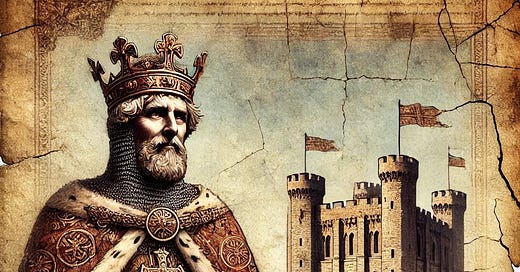Christian Kingship and the Impending Fall of Liberal Democracy
Can we go forward by going back? Some food for thought in an election year.
Ring out false pride in place and blood,
The civic slander and the spite;
Ring in the love of truth and right,
Ring in the common love of good.
Ring out old shapes of foul disease;
Ring out the narrowing lust of gold;
Ring out the thousand wars of old,
Ring in the thousand years of peace.
Alfred the GreatToday we’re going to dive into politics a little. With ongoing chronic political crises happening across the Western world, and a possibly civilisationally pivotal US election looming, there is a growing sense of disillusionment with modern democratic systems. It seems that, no matter which party or candidate wins an election in any Western nation, the outcome is inevitably disappointing. The expression, “The Uniparty” is not merely descriptive of the lack of meaningful differences in policy, but of the largely justifiable cynicism of the electorate who increasingly refuse in droves to even turn out for elections anymore1.
Electoral choices have become a zero-sum game, where the options presented often feel like no real choice at all, all framed in a toxic miasma of distrust in institutions of any kind, especially the news media. The promises of politicians consistently fall short, and all electoral politics everywhere seems like a circus of the absurd. Instead of progress, voters are left with a sense of stagnation and decline; the feeling of helplessness and hopelessness is becoming poisonous to all our polities. This political malaise has fostered a pervasive belief that voting, as we practice it now, is delivering nothing, not even a brake on the slide into an unknown and fearful abyss of societal chaos.
The deeper question arises: if our current systems of governance are failing to solve the complex problems of our age, is it the structure of democracy itself - at least as we’ve conceived it since the 18th century - that’s in need of rethinking?
I thought it would be useful to look closely at the concept of Christian kingship and Christian civil law, what it is and why it worked for so long since the Christianisation of imperial jurisprudence in the old empire, and after the fall of Rome to Odoacer.
In today’s post for paid subscribers, we’ll look at the great shift in law of the old empire’s pagan and pragmatic legal framework to the concepts of civil law based on Divine law and the obligations of the state to individuals… and our slide backwards since the 18th century.
Christian kingship is rooted in the divine authority of God’s law and offers a framework where rulers are held to a higher standard, not just by their constituents but by a transcendent moral order. This difference is profound. In a Christian state, laws are not simply a reflection of popular will but a manifestation of God’s justice, and the ruler’s role is to uphold that justice.
The Sacred Images Project is a reader-supported publication where we talk about Christian life, thought, history and culture through the lens of the first 1200 years of sacred art. It’s my full time job, but it’s still not bringing a full time income, so I can’t yet provide all the things I want to and am planning for. You can subscribe for free to get one and a half posts a week.
For $9/month you also get the second half of the weekly Goodie Bag post, plus a weekly paywalled in-depth article on this great sacred patrimony, plus our Benedictine Book Club in the Substack Chat. There are also occasional extras like downloadable exclusive high resolution printable images, ebooks, mini-courses, videos and eventually podcasts.
If you would prefer to set up a recurring donation in an amount of your choice, or make a one-off contribution, you can do that at my studio blog.
This helps me a lot because the patronages through the studio blog are not subject to the 10% Substack fee:
This is the site where I post photos of my own work as it develops. I have a shop there where some of my drawings and paintings are available for sale as prints, as well as some other items.
Subscribe to join us below.
In the following post, we’ll take a look at the great shift after the establishment of Christianity as the basis of law, from Roman pagan imperial law; the new concept of the Rule of Law to which the ruler is subject as well as the common man, and the equal value of persons. And we’ll examine how those ideas were abandoned in the new Enlightenment dispensation of “liberal democracy” … and where that’s headed…





